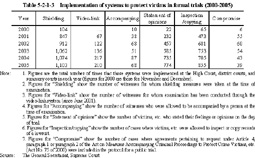| Previous Next Index Image Index Year Selection | |
|
|
2 Protection, etc. of victims in formal trials Victims often have to appear as witnesses in formal trials. There are various systems to protect witnesses as follows: a system to take measures so that the defendant and the witness may not see each other (shielding measures); a system where the witness may be seated in a place other than the court of trial within the same premises and the judges and persons concerned in the case may then examine the witness by audiovisual communication through the transmission of images and sound (video-link system); and a system that allows a witness to be accompanied by a person whom the court considers appropriate.
Also, the court shall give victims etc. the opportunity to state their opinions, in principle, on the date of trial if they offer to express their feelings about damage and opinions on the cases. Furthermore, the defendants and victims, etc. in a criminal case may jointly request that any agreement reached between them in a civil dispute related to the criminal case be included in the protocol for a public trial. Any such agreement included in the protocol has the same effect as a judicial compromise. Courts in charge of criminal cases in progress may allow victims to inspect or copy the records of a lawsuit between the first public trial and the closing of the lawsuit, if the victims request such inspection or copying and the courts find sufficient grounds to grant such requests, such as being necessary to exercise their rights to claim compensation for damage. Table 5-2-1-3 shows the implementation of the abovementioned systems. Table 5-2-1-3 Implementation of systems to protect victims in formal trials (2000-2005) In contrast, records of cases of non-prosecution shall not be disclosed in principle. However, there are cases where victims, etc. needs objective evidence such as on-the-spot investigation reports, investigation reports on taking photographs, and post-mortem examination reports to exercise their rights to claim compensation for damage or other rights in civil lawsuits to recover the damage. In light of this, public prosecutors offices admit inspection or copying of such evidence when considering it appropriate without any risk of invading the privacy of any persons concerned. Furthermore, public prosecutors offices provide civil courts with written statements in the record of a case of non-prosecution and information to identify witnesses under certain requirements. |
